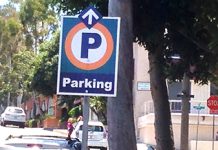Re-issuing municipal bonds that pay for undergrounding utility lines in Laguna Beach neighborhoods at a lower interest rate was approved last week by the City Council.
Due to historic lows in interest rates, City Treasurer Laura Parisi asked the council to combine seven existing assessment-district bonds into a new one that would be refinanced and re-sold. At current-market interest rates, 724 homeowners will potentially save an average of $55 a year on their property tax bills for an overall savings of $279,000 across the seven assessment districts. Parisi said the total combined value of the bonds in all seven districts is $3.8 million.
For the first time, Laguna’s municipal bonds, which traditionally sell out quickly, will be made available directly to Laguna Beach residents, said Parisi, who has been treasurer for 12 years. Notice of the sale will be placed in local newspapers through Southwest Securities, giving locals an unusual opportunity to invest in the town’s capital improvement projects.
The ads will be placed in January with the bond sale closing Feb. 15. To buy the local bond, individual investors would need to open an account with the underwriter, said Parisi.
Money invested to purchase the bonds pays to remove overhead utility poles and replace them with underground lines in neighborhoods throughout the city. Maturity dates for existing bonds range from 2012 to 2024, reflecting when the assessment districts, organized by property owners, won approval.
The city issues bonds to finance expensive projects, in this case, undergrounding utilities, on behalf of the property owners, who repay the project costs over time at a specified interest rate.
Homeowners in the undergrounding districts make payments on their property tax bill to service the debt. The city then provides the bond-holder the amount due when their bonds mature in 15 years. So it benefits the property owner if the bond can be refinanced at a lower interest rate, Parisi added.
Because of their reputation as credit-worthy instruments, municipal bonds funded by an assessment on property are typically attractive to investors seeking fixed-rate and tax-exempt income.
Parisi told the council she pursues the lowest rates available. “Laguna Beach is a low risk by the bondholders because of our high home-values to low outstanding-debt ratio,” she said, “We take full advantage and negotiate the lowest rates possible for homeowners.”
Councilmember Toni Iseman encouraged residents considering new undergrounding assessment districts to also take advantage. “This is a good time for people to hurry up and have bonded indebtedness because our interest rates are so low,” she commented.
The council directed Parisi to limit paying an underwriter to reissue the bonds no more than $125,000.
In other issues regarding neighborhood undergrounding assessment districts, the council declined a recommendation from the city’s staff to charge residents $1,000 upfront to underground utilities in a neighborhood of 45 homes near Catalina and Ruby streets.
The upfront fee conflicts with city procedures, residents claimed. “If you go to the (city’s) website right now,” said May Parrett, “and look up how you do this process, it does not talk about putting money upfront.” Parrett said “the mother pole” of the neighborhood stands outside her kitchen window.
Protestors requested that if the city needs to change its procedures due to economic constraints and past debacles, the subject needs to be dealt with independently and not dropped on 45 unaware property owners, 32 of whom agreed to have their property assessed at the average of $25,000 for undergrounding the poles. The assessment will be paid to the city over a 15-year bond period. The city has not yet determined the total cost of the job.
“I understand the reason (for the upfront fees),” said councilmember Elizabeth Pearson, “because we took it in the shorts on the last one.”
Two years ago, a proposal to underground utilities in the Canyon Acres neighborhood in Laguna Canyon and the Summit Drive neighborhood off of Bluebird Canyon Drive was defeated by residents. The city had underwritten $112,000 in design and undergrounding plans. That cost was recovered through the city’s street-lighting fund, according to the city’s public works director, Steve May.
“The reason the city is contemplating upfront money in assessment districts,” explained Mayor Pro Tem Verna Rollinger, “is because when a district fails the entire community has to pay that bill. It’s not a whim and we’re not trying to trick anybody.”
Mayor Jane Egly reproved residents with a caveat: “I’m charging all of you who came here tonight and say if you want to go forward with the old rules, you make sure you go forward and get all your neighbors together so that we don’t end with a debt at the end.”




